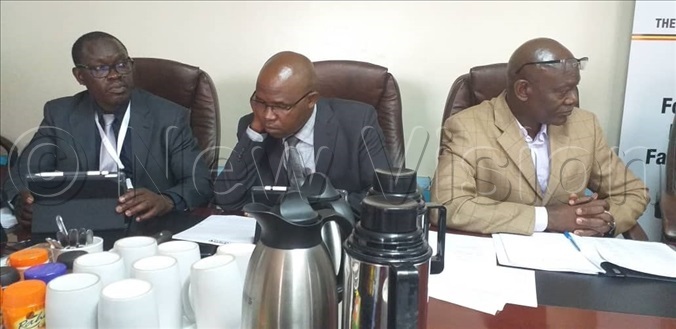Why 19-year-olds will not be allowed to vote
The EC revealed that in 2014, they presented before Parliament the need to amend the law to allow people who turn 18 to register and vote even a month to the elections, but Parliament did not find the suggestion worthy.
2021 ELECTIONS
Elections are around the corner and the Electoral Commission (EC) is doing everything possible to ensure that all is set for the coming elections.
Due to this, a voter's registration update exercise was carried out. However, it revealed that citizens who will be 19 by the next general election will not be allowed to vote.
This prompted members of the Citizen's Coalition for Electoral Democracy in Uganda (CCEDU) Dr Miria Matembe, Philip Idiro, Dr Slyvia Namubiru, Robert Sempala and Catherine Kanabahita, to consult the EC as to why 19-year-olds will not be allowed to vote. The members sought to understand why the period that was stipulated for the update of the voter's register was short and bound to exclude some Ugandans.
"There is a citizen who turns 18 every other day. As a commission, how are you going to ensure they are not denied a chance to vote?" Matembe, the CCEDU board chairperson, asked.
The EC revealed that in 2014, they presented before Parliament the need to amend the law to allow people who turn 18 to register and vote even a month to the elections, but Parliament did not find the suggestion worthy. As such, the EC is operating based on the mandate stipulated in Article 61(2) of the Constitution, which gives them the discretion to determine the cut-off date for voter update. However, this discretion, the EC explained, is determined by a number of factors, which include the need for proper planning, budgeting for planned activities and printing of sufficient ballot papers for all voters, which printing is usually done abroad.
 EC commissioners during the meeting with the CCEDU
EC commissioners during the meeting with the CCEDU
"All activities on the Electoral roadmap are interlinked and one activity feeds into another. Voter update feeds into display and display feeds into the nomination of candidates. For instance, a presidential candidate is required to gather 100 signatures from two-thirds of the country before he can be nominated, but all the signatures gathered should be of registered voters. How would a candidate gather these signatures if the update process was delayed?" Justice Simon Byabakama, the Chairperson of the Electoral Commission, asked.
Byabakama implored the public to appreciate that some of the elections that will be held as early as next year (2020) require that the voter's register is ready on time.
"By April next year, we shall already be holding elections for the special interest groups, namely - people with disabilities, older persons, the workers and the youth. If the update is left open, how then would the commission conduct these elections," he wondered.
He also said the EC is legally bound to carry out update and display within a given timeframe, which is calculated from the day of the general elections. He added that the 2021 elections will be conducted in January, not February as has been in the previous electoral cycles".
Leonard Mulekwa, the head of operations at the EC, said there will be an increase in the volume of elections in 2021.
"For instance, in 2016, we had 1,300 sub-counties, but in 2021, we shall have over 2,000 sub-counties. The parishes have also increased from 9,500 in 2016 to 11,000 in 2021. Each parish must send a councillor to the district.
"Six months from now, we would have presidential nominations. Given this fixed time frame and the number of activities that should take place before nomination, the Commission was very considerate in stretching the update to 23rd December 2019," he added.
Mulekwa explained that after the update, communities at the village level will have to cross-check the register to establish if their particulars were well-captured.
Afterwards, a display of voters at all 34,236 polling stations would follow.
"The public should, however, be cognisant of the fact that these polling stations could increase based on the information that is picked up in the voter update process," Byabakama said.
CCEDU further brought to the attention of the commissioners the fact that some update centres opened late and closed early, especially over the weekend. Some learners were also turned away from the update centres because they did not have national identity cards.
They also raised the issue of the shortage of Form 3, especially in the upcountry centres of Bududa, Omoro, Gulu and Koboko. The EC promised to resolve the Form 3 issue at update centres. They also informed CCEDU that they had decided to extend the update process to cater for the failing computers and biometric machines, adding that they were optimistic that the process would be much smoother in the remaining days.
Byabakama said they had engaged the Uganda Communications Commission and they would surely inform the public.